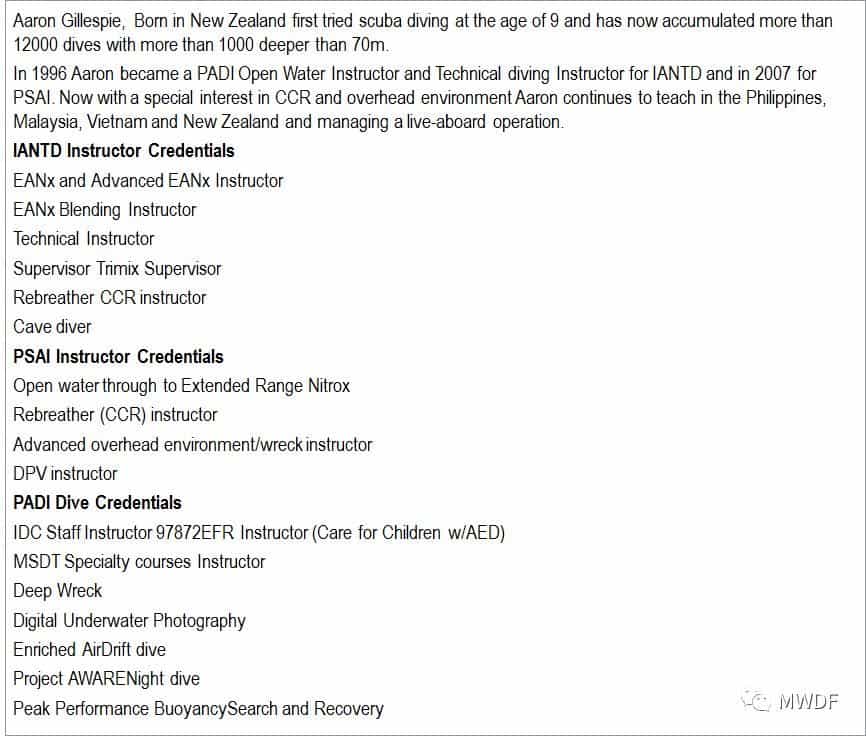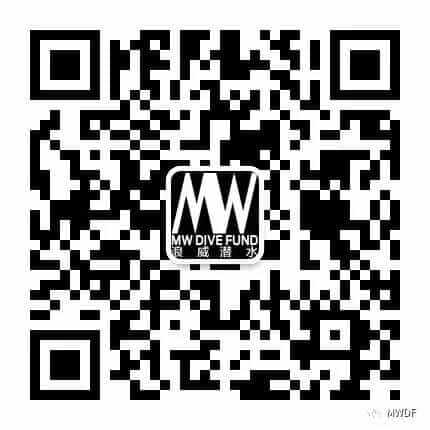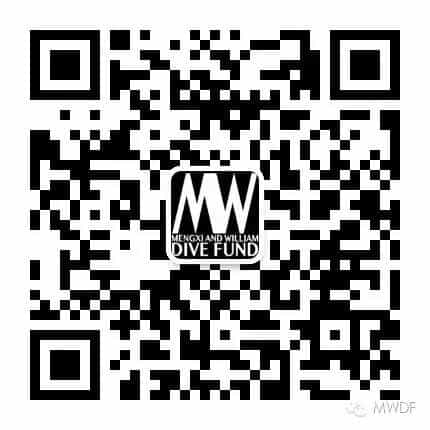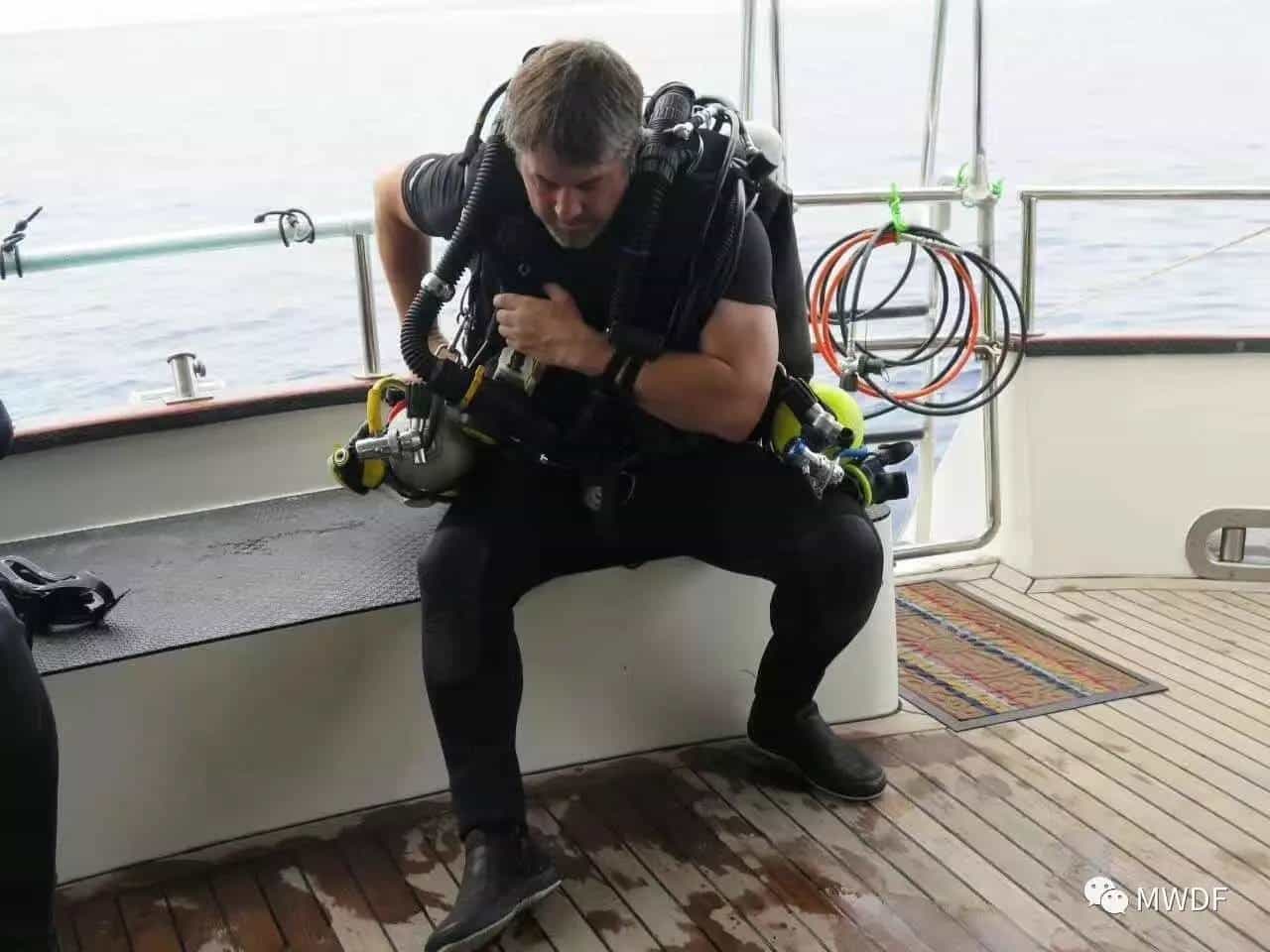据说高逼格潜水员都关注分享MWDF了
MWDF微信公众号ID:mwdf2016
我们的第一个大神来自新西兰,却在中国呆了8年。小编和大神的相识在苏比克的一艘豪华游艇上,几乎是苏比克最好的技术潜水船之一。有所有你想得到的装备(CCR, DPV, 双瓶,氦气)应有尽有。了解到他是IANTD和PSAI的双教练的时候不禁觉得自己是井底之蛙,这样的世外高人,我们竟然完全不知?还好,有幸邀请到Aaron给我们讲讲他的潜水经。
1.潜水经历介绍
我的PSAI教练是Simon So和Mark Cox。我也有幸能和PSAI的创始人Hal Watts和总监Gary Taylor(前IANTD)一起潜水。
2.潜水进阶技巧分享
深潜(60-110m)最关键的就是减压和停留时间。这就要求我们有超强的自律、耐心、自信、应对事故的能力和所有的技术技巧和对环境的警觉性。 你不仅需要在水下日复一日的训练也需要在教室里好好把你能接触到的减压相关的知识都学好(理论,病状,原理,算法等等)。
教室里的技巧和潜水经验不能相互替代。这两个行为必须连起来。
3.潜水上最重要的成就和最开心的时刻
4.潜水上碰到的困难和问题
5.如何选择潜伴
6. 中国潜水员和其他国家潜水员的差别
另外,装备不能代替训练和经验。不能仅仅因为你有一个好的品牌的装备,就觉得自己是一个好的潜水员,可以进行某些你并不具备能力的潜水。技术潜水要求对于每个潜水技巧形成肌肉记忆,对每个潜水技巧要反复练习直到他变成你的应激反应。
我在中国住了8年,90%的学生都是中国人,我很爱中国。但是在过去7年在中国的教学过程中,我不得不注意到中国潜水员更看重他们的个人状态和证书,而不是在成为一个足够水平的潜水员以后再进行下一个级别的训练。我从来没有让学生不通过课程,但是我在发证前让他们不断回来练习、延长他们的训练。如果我在水下需要帮助或者碰到紧急状况,我希望我周围的潜水员都有足够的能力和经验。
Aaron的生平简介,证书多到写不下

后面还有一大波大神来袭。
当然如果你有心目中的大神,也可以推荐给小编。如果你有想要问的问题也可以告诉小编哦。
附上原版英文访谈稿:
1. Could you please introduce your diving experience? What encouraged you to do tech dive?
I was extremely fortunate as My IANTD instructors were and still are some of the most renowned around the world. Paul Neilsen was my first IANTD Instructor and then my long term dive buddy and the first man to dive to 1000ft (308m) John Bennett was my technical Instructor. I also did training with IANTD franchise ownerAlex Santos.
PSAIInstructors have been Simon So and Mark Cox while also having the opportunity to dive with founder Hal Watts and director Gary Taylor (ex-IANTD).
2. What do you think is the best way to improve diving technique? What’s the divingtechnique that you think is the most important?
Technical diving is all about timing and being comfortable is an in hospitable environment….To better enhance your technical abilities then deep diving is asure method.
Deep air diving (60-110m) is all about decompression and runtimes. It requires discipline, patience, self reliance, contingencies, all technical skills and environmental awareness. Not only do you need to be in the water day after day but you also need to be in the classroom and to read everything you can about decompression(theroies, illnesses, methods, algorithms) etc.
Classroom and experience do not substitute each other…try must be done in conjunction.
3. What’s the biggest achievement in your diving experience? What’s your happiest experience?
With an interest in Technical diving and specializing in Deep air and mixed gas(Trimix) diving, together with John Bennett set the open water untethered deep dive record on open circuit to 122 meters in the Philippines in 1997 we used our decompression tables and the or ies we had developed through research and training. Computers were not available in those times. John Benett continued to become the first man ever on Open circuit to dive deeper than 1000ft. I continued to support and undertake further diving specialty areas such as cave and Rebreather diving.
4. Have you ever encounter any difficulty or major setback?
Everything we do at this level is a calculated risk so we ensure everything is planned to the finest detail and we have many contingencies. I love diving and want to dive every day so everything needs to be planned to ensure that I can dive everyday. Don’t be afraid to call a dive. Anyone in the team can call the dive at anytime and we try again another day.
5. How do you choose buddy? How is your buddy?
I choose my buddy by experience with that person and their level of ability depending on our objective. Regardless of someone’s certification level or there number of dives I still choose to buddy with those I dived with before.
6. What’s the biggest difference between Chinese diver and other divers?
Diving isa very new industry to China and I think the concept of safety has not yet been realised. Unfortunately the amount of Chinese fatalities and serious incidents in such a short period reflects poor training and safety drills not reinforced due to cheaper courses from cut throat competition. Cheaper courses or discounted training is exactly what students should be avoiding.
Also the fact that equipment does not replace experience or training. Just because you have good brand name equipment does not mean you are a good diver or capable of carrying out particular types of diving. Technical Diving requires muscle memory so on every single dive all technical skills short be practiced again and again until it becomes a reaction without having to think. Don’t get me wrong, I’ve lived in China 8 years and love the people. 90% of my students are Chinese but I’ve noticed over the past 7 years teaching Chinese that their personal status or certificate level is more important to them than becoming a proficient diver at one level before moving on. I’ve never failed a student but I’ve made plenty come back or extend their training before certification. …if I need assistance in the water or an emergency situation I want to make sure those around me are capable and experienced.
长按,识别二维码,添加mwdf服务号,猜猜今天是谁在和你聊潜水:

MWDF(浪威潜水)一个正经潜水基金会,两个不正经潜水员,传播务实的潜水信息,打造浮夸的潜水逼格产品。关注我们,一起浪遍天涯!长按下图,识别二维码关注。也可关注网页www.mwdf.tech

日食不过三餐,夜昧不过六尺
2017年主题:”浪”迹天涯

